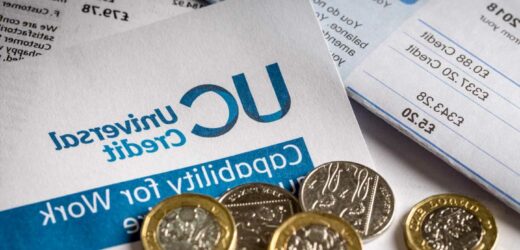CLAIMING Universal Credit can give you money to live off if you're out of work, or top up your income if you're on low pay.
But what about if you have some cash stashed away already? We explain how your savings can affect getting the benefit.
Putting some money aside for emergencies and rainy days can help you get by in tough times.
This might come in handy if you lose your job and need money to pay bills and living costs.
You could claim Universal Credit too – and having some money in the bank already won't always stop you from getting the extra help.
When you're on Universal Credit you're even encouraged to save some of you cash through a special account.
So how much exactly can you have saved on Universal Credit? Here's what you need to know.
How much can I have save and still get Universal Credit?
Any savings you have up to £6,000 is ignored under the Department for Work and Pension (DWP) rules.
Money you have over this amount but under £16,000 will be counted however.
The money is treated as if you have a monthly income of £4.35 for each £250, according Turn2Us.
Most read in Money
Thousands of households to get £180 free cash paid directly into bank account
Thousands of energy customers to get compensation – check if you're one of them
I tried five tricks to banish condensation and mould – the result surprised me
Martin Lewis’ MoneySavingExpert explains big change to Premium Bonds
That includes "parts of £250" too. The charity also gives a useful example of how this works.
So with savings of £6,300, the first £6,000 would be ignored when claiming Universal Credit.
The additional £300 is counted as if you were earning a monthly income of £8.70.
That's because it's £250 over the ignored amount, plus another £50 over – so that counts as another £250.
It's worth noting that a partner's savings count towards these savings amounts too, even if you are only making a claim for yourself.
On the other hand, there's some money that might not count as savings at all for Universal Credit purposes.
Money is disregarded if it comes from the sale of a home and you are using it to buy a new home.
The same goes for if you get an insurance payout for damage to your home, or if you take out a loan for making home renovations.
If you have savings of over £16,000 then you won't be able to claim Universal Credit.
There is an exception though, according to EntitledTo.
This applies if you move to Universal Credit from tax credits through something known as managed migration.
In this case, your savings won't count at all to your eligibility for 12 assessment periods.
Universal Credit is replacing tax credits and everyone will be moved over eventually.
Manages migration is when you are invited to move over, rather than choosing to or via a change of circumstances.
You need to report how much savings you have (and a partner's) when making a claim for Universal Credit.
You may be asked for documents like bank statements or saving certificates.
Can I save money on Universal Credit?
If you're able to save money while claiming Universal Credit it's a good idea.
Having savings means you won't have to borrow money and you have a cushion to fall back on in case of emergencies.
In fact there's a special account for people on Universal Credit and other benefits that offers a extra cash on top.
The Help to Save scheme pays a bonus on top of the money you stash away in the account.
Savers will get a 50p bonus for every £1 they put in the account over four years.
You can save between £1 and £50 every month, so you would get a £25 bonus each month if you paid in the maximum amount each time.
Over a year that adds up to £300, and reaches £1,200 over the full four years that you can have an account.
You will get your bonuses at the end of the second and fourth years of having the account.
You can find out who's eligible and how to get an account in our guide.
How much Universal Credit can I get?
Your individual circumstances will affect how much Universal Credit you receive such as how many children you have, your earnings, and how many people you reside with.
And of course your savings can too, as we've explained.
Everyone who is accepted on Universal Credit will be entitled to a Standard Allowance – how much you get isn't affected by whether you're single or not.
- Single and aged under 25: £265.31 per month
- Single and aged 25 or over: £334.91 per month
- Joint claimants both aged under 25: £416.45 per month
- Joint claimants where one is aged 25 or over: £525.72 per month
Once your household allowance is calculated, the DWP will take into account any additional claim elements such as children, housing, or disabilities.
You can find out more about these in our guide and how to claim.
What else can affect how much Universal Credit I get?
How much savings you have isn't the only thing that could reduce the amount of Universal Credit you get.
If you work while claiming Universal Credit, the more hours you work and the more money you earn, the more your payments will be reduced.
For every £1 you earn your Universal Credit payments reduce by 55p – this is known as the taper rate.
It kicks in once claimants are earning above the Work Allowance, if they are eligible.
You get a Work Allowance if you (or your partner) are responsible for a child or have limited capability for work.
How much it is depends on whether you claim the Housing Costs element of Universal Credit.
The monthly work allowances are:
- £344 if you get help with housing costs
- £573 if you don't get help with housing costs
How much you earn and whether you'll be entitled to Universal Credit payments will depend on your circumstances.
Meanwhile the benefit cap can limit the total amount you can get.
The total amount of benefits you can receive is capped at £20,000 a year outside Greater London if you’re in a relationship or a single parent and your children live with you.
It is £13,400-a-year if you live by yourself.
Inside Greater London, the equivalent thresholds are £23,000 and £15,410.
Read More on The Sun
I was dress-coded at work, HR said I was ‘pushing it,’ I can’t help my curves
Apple just released a free new iPhone app – and fans are saying the same thing
The monthly amount you get may also be reduced if you are sanctioned.
This is when money is deducted for not attending a job interview, for instance.
Source: Read Full Article









